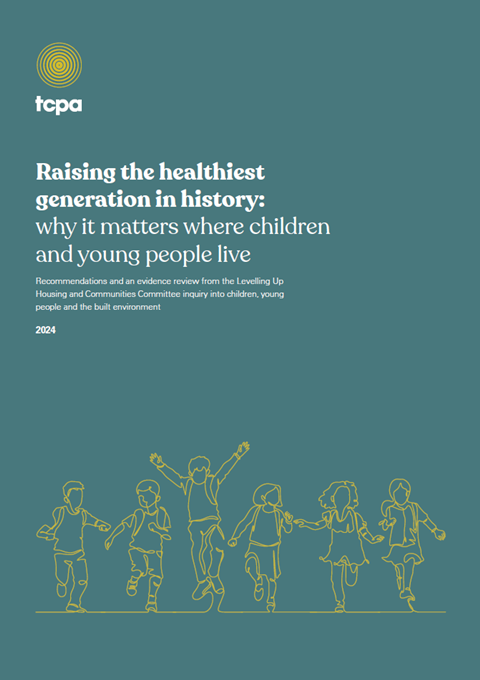A new report calls on Labour to address the built environment’s critical role in raising the “healthiest generation in history”
A new report by the Town and Country Planning Association (TCPA) claims that the government’s commitment to raise the “healthiest generation in history” cannot succeed without significant changes to the built environment.
The report, Raising the healthiest generation in history, argues that housing, urban design, and public spaces play a critical role in children’s health and wellbeing and calls for urgent policy reforms to address longstanding gaps.

The report is based on evidence collected by the Levelling Up, Housing and Communities (now Housing, Communities and Local Government) select committee during its inquiry into children, young people, and the built environment.
The inquiry received contributions from over 130 organisations and individuals, including Playing Out, Fields in Trust, childhood expert Tim Gill, and architect Dinah Bornat. However, it was interrupted by the July 2024 general election, leaving its recommendations unpublished until now.
The report describes a concerning decline in children’s physical and mental health, with poverty and inequality cited as key factors.
By age 15, children in the UK report the lowest average life satisfaction compared to their peers across 26 European countries. According to the report, the built and natural environment where children live is a major determinant of their development and health outcomes.
Despite this, the report notes that children are scarcely mentioned in national planning policies. The National Planning Policy Framework for England references children only once, while the terms “youth” and “young” are entirely absent.
The TCPA report seeks to address this gap by advocating for changes at both national and local levels to prioritise children’s needs.
“We hope the government sees this report for the game-changing opportunity it is to do things differently”
The report outlines a series of proposals aimed at creating healthier environments for children and young people. Key recommendations include:
- Developing a national play strategy for England and integrating child-friendly design principles into housing and public spaces.
- Establishing national leadership for children’s wellbeing, such as appointing a cross-departmental minister for children and adopting the UN Convention on the Rights of the Child into UK law.
- Updating the Equality Act 2010 to better protect children and young people’s rights in public spaces.
- Enhancing access to nature through a Green Infrastructure Standard, ensuring every child has access to green and blue spaces within a 15-minute walk of their home.
- Promoting a spatial justice approach to transport and mobility that considers the needs of children and young people.
Gemma Hyde, projects and policy manager at the TCPA, highlighted the lack of child-focused policymaking in the built environment: “Where children and young people live has a profound impact on their healthy development and life chances… Yet, children are rarely considered, or their input accepted, in policymaking and decision taking at the national and local government level.”

A spokesperson for Playing Out emphasised the urgency of reversing the decline in children’s outdoor activity: “Creating safe, child-friendly streets, estates, and neighbourhoods is a huge part of this. We hope the government sees this report for the game-changing opportunity it is to do things differently.”
Helen Griffiths, CEO of Fields in Trust, pointed to the lack of play spaces as a systemic issue: “Over 2 million children don’t have access to places to play close to where they live… This is an opportunity that must not be missed.”
The report seeks to ensure that the evidence gathered during the dissolved parliamentary inquiry can still be used to influence policymaking. It summarises evidence across seven themes and includes case studies demonstrating best practices. With housing and urban design identified as critical to health outcomes, the report calls on the government to take urgent action to address these challenges.
The full report is available on the TCPA’s website.
















No comments yet